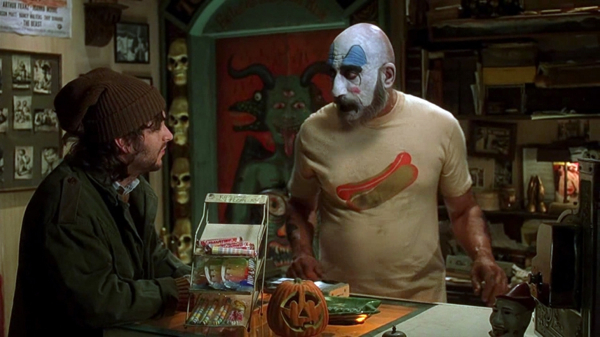Movie review by Greg Carlson
For a few years now, horror fans have eagerly awaited the release of rock-auteur Rob Zombie’s feature-filmmaking debut, the colorfully titled “House of 1000 Corpses.” Originally prepared for Universal Studios (a shrewd move considering the parade of references, visual and otherwise, to Zombie’s beloved, classic Universal horror film cycle), the movie was completed in 2000 and then dumped, apparently because its content was expected to earn it a rating of NC-17. Following a flirtation with MGM, the movie finally limps into theatres under the aegis of the less fearful Lion’s Gate. Unfortunately, “Corpses” was decidedly not worth the wait.
Zombie, who boasts an encyclopedic knowledge of 20th century trash, horror, and exploitation culture as well as a keenly developed visual sensibility honed while making a series of clever music videos, seems at first an ideal candidate to resurrect the flagging fright genre. For the first half hour or so, “Corpses” even holds the promise of being able to deliver the kind of experience deserving of a “Famous Monsters of Filmland” cover story. Too soon, however, it becomes painfully apparent that Zombie is a much better visual stylist than he is a writer, as one tired cliché after another rears up to insult the audience. The only “shock” here is the realization that Zombie’s imagination has painful limitations.
If “Corpses” artfully explores Zombie’s predilection for drive-in movies, circus sideshows, 16mm bondage loops, and late night TV horror show hosts, its story borrows too heavily from Tobe Hooper’s landmark “The Texas Chainsaw Massacre” and its first sequel. A quartet of young adults runs out of gas (natch) during a rainstorm (ditto) on Halloween 1977. The travelers locate the service station of one Captain Spaulding (perfectly played by veteran freakshow Sid Haig), and while no explanation is given for the Marx Brothers reference, the crafty entrepreneur invites the two couples to partake in his Grand Guignol dark ride, a biographical homage to sadists and killers like Albert Fish, Lizzie Borden, Ed Gein, and the fictional Dr. Satan, a psychopath lynched for his unauthorized operations at a local hospital.
Surprisingly, the kids make it out of Spaulding’s roadside museum without a scratch, but unwisely pick up sexy hitchhiker Baby (Sheri Moon, very good in her feature debut), who invites everyone back to her neglected, decaying, ramshackle homestead. Greeted by the voluptuous horror of Karen Black as Mother Firefly, the waylaid innocents are soon introduced to the rest of the family, a gallery of revolting malefactors ready to systematically victimize the sitting targets with every conceivable excruciating torture and humiliation. At this point, “Corpses” immediately begins to rot, as one boring contrivance after another merely provides opportunity for unrelenting abuse and gore, devoid of anything resembling wit or skill.
“Corpses” expires with very little to recommend it to even the die-hard horror fanatic. While Zombie stages some intriguing and disturbing scenes (including an inspired lip-synch of Baby crooning “I Want to Be Loved By You” and the execution of a cop in a grisly, time-suspended tableau), his screenplay fails him at every turn. Zombie enthusiasts are likely to enjoy the music (composed by Zombie and Scott Humphrey), which includes the bizarre pairing of the director and Lionel Richie on a souped-up remake of “Brick House.” Those who find little to like in the necromancer’s tunes, however, will be equally hard-pressed to discover anything redeemable in the movie itself.
